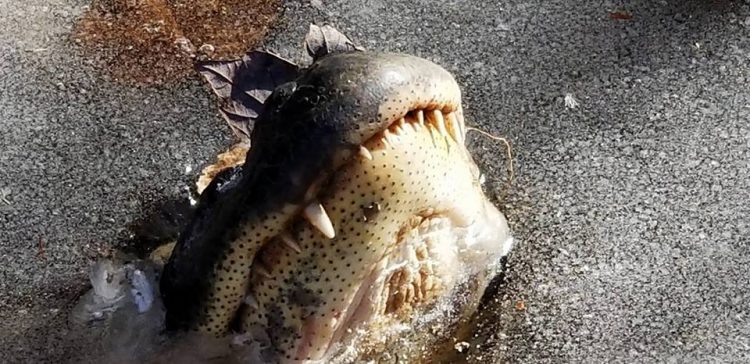Alligators are infamously fierce creatures and have existed in the primary Crocodylia body form for over 180 million years, making them living dinosaurs. These massive reptiles have adapted in some unusual ways to ensure their long-term survival, and one such adaptation astounded visitors and staff at a North Carolina swamp park this week.
Shallotte River Swamp Park in Ocean Isle Beach, 200 miles east of the state’s largest city Charlotte, recently posted a video on Facebook documenting what appeared to be a pond full of dead alligators. A massive cyclone had blown through the state the week before, bringing record lows, and causing the pond to freeze over. Crocodiles aren’t exactly known for their love of icy waters, so seeing a bunch of snouts sticking out through the ice, you’d be inclined to think that the huge reptiles had died. But you’d be wrong.

Photo: Shallotte River Swamp Park/Facebook
Apparently, alligators instinctively know when water is about to freeze and stick their snouts above the surface at the right moment while the water turns to ice around them.
“They have been around for millions of years,” George Howard, the general manager of the park, said of the species. “They are one of the only species in existence that is virtually unchanged. And they continue to be good at just surviving. This is just another example of how tough they are.”
Similar to many other reptiles, alligators slip into a state of brumation (similar to hibernation) when temperatures dip below a certain threshold. Their breathing and metabolism slow down, and they enter a vegetative state for the duration of the cold spell. Brumation is normal reptilian behavior, but bizarre nonetheless for visitors seeing toothy snouts sprouting from the ice.
“Just hanging out in the water,” Howard narrated in the video. “Pretty amazing. … Look at those teeth. This is the time of year when they are just hanging out, waiting for it to get warm.”
The video has been shared many times and received tens of thousands of views on the social media platform. Viewers have inundated the Shallotte River Swamp Park Facebook page with comments and questions regarding the alligators, with many fearing that the animals were dead. Several have asked what would happen if someone were to step on the reptiles in the wild accidentally, but the park staff reassured them. “No, they will not respond,” they wrote in a Facebook post. “They are trying to conserve energy to maintain body temperature.”
Alligators faced eradication in the early 20th century, but through efforts by conservationists, the population has sprung back in North Carolina. Most live in the southeastern region of the state but have been recorded by scientists as far west as Richmond County. Shallotte River Park is a 65-acre sanctuary that rescues alligators previously kept in captivity, including two that had been used by drug dealers as guard animals. Alligators prefer the coastal region with creeks, ponds, wetlands, and rivers that provide an extensive and interconnected web of habitats.
When the temperatures rise again, the alligators will wake up and carry on life as before, and Howard hopes to document that as well.






